

Intelligence artificielle en santé: création d'un comité pilote d'éthique du numérique. Créé à l'initiative de Matignon, sur recommandation du CCNE, ce comité pilote d'éthique est né de l’avis 129 du CCNE.
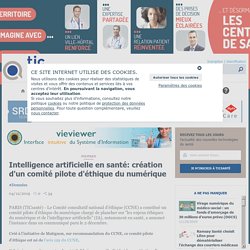
Celui-ci proposait, en septembre 2018, "de jouer un rôle d’aide à la constitution d’un futur comité d’éthique du numérique, spécialiste des enjeux numériques dans leur globalité". La mise en place de cette structure fait également écho aux recommandations formulées par Cédric Villani, mathématicien et député LREM de l'Essonne, dans son rapport sur l'IA remis en mars au gouvernement. Le comité pilote d’éthique du numérique portera ses premiers travaux sur trois saisines, dont deux se rapportant à la santé: Report: IBM Watson delivered ‘unsafe and inaccurate’ cancer recommendations - MassDevice. The Machines Are Getting Ready to Play Doctor - MIT Technology Review. It might not be long before algorithms routinely save lives—as long as doctors are willing to put ever more trust in machines.
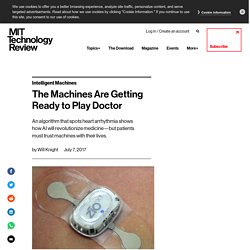
A team of researchers at Stanford University, led by Andrew Ng, a prominent AI researcher and an adjunct professor there, has shown that a machine-learning model can identify heart arrhythmias from an electrocardiogram (ECG) better than an expert. The automated approach could prove important to everyday medical treatment by making the diagnosis of potentially deadly heartbeat irregularities more reliable. It could also make quality care more readily available in areas where resources are scarce. The work is also just the latest sign of how machine learning seems likely to revolutionize medicine. In recent years, researchers have shown that machine-learning techniques can be used to spot all sorts of ailments, including, for example, breast cancer, skin cancer, and eye disease from medical images.
Still, Ng has no doubts that a revolution is coming. Accenture, Microsoft building blockchain ID prototype for healthcare, others. Accenture and Microsoft have created a prototype based on blockchain technology with the aim of creating a digital identity for 1.1 billion people around the world who don’t have a formal ID.
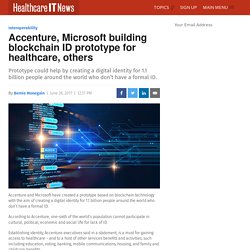
According to Accenture, one-sixth of the world’s population cannot participate in cultural, political, economic and social life for lack of ID. Establishing identity, Accenture executives said in a statement, is a must for gaining access to healthcare – and to a host of other services benefits and activities, such including education, voting, banking, mobile communications, housing, and family and childcare benefits. [Also: 3 principles for better understanding blockchain] 91% de réussite pour une nouvelle intelligence artificielle capable de poser un premier diagnostic - France-Diplomatie - Ministère de l’Europe et des Affaires étrangères. Cela est rendu possible par une combinaison de technologies d’intelligence artificielle, de reconnaissance du langage naturel et de données du patient pour détecter des symptômes et produire une liste de maladies possibles et de recommandations.
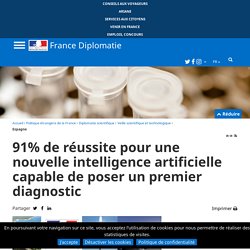
Laurent Alexandre: «La médecine personnalisée ne doit pas être le monopole des GAFA» La médecine personnalisée et prédictive vise à utiliser nos caractéristiques génétiques croisées avec notre dossier médical pour optimiser les prises en charge médicales.

C’est le passage du prêt-à-porter au sur-mesure et, associé au dossier électronique, cela induira un suivi en continu des effets des médicaments.
Algorithm in healthcare. MMS: Error. Growth - European Commission - News. Vous pourrez bientôt tester la qualité de votre sperme avec votre smartphone. Plus besoin de vous déplacer dans un laboratoire d'analyses médicales : des chercheurs américains ont mis au point une application pour smartphone qui permet d'analyser la qualité du sperme à domicile.
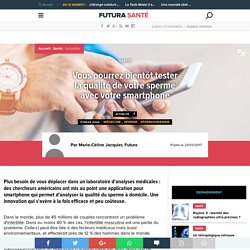
Une innovation qui s'avère à la fois efficace et peu coûteuse. Dans le monde, plus de 45 millions de couples rencontrent un problème d'infertilité. A.I. Versus M.D. Leading AI companies in healthcare (Part 1) What if your ‘doctor’ were a robot? How AI is challenging our ethics. Imagine you are about to receive a diagnosis for what is suspected to be some form of leukemia.
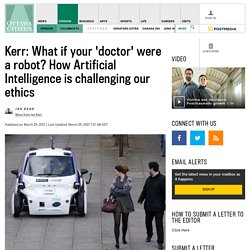
Your doctor tells you she needs a few minutes to consult with Dr. Watson before your appointment. It has been a difficult and unusual case, which is why Watson was brought in to help. Watson, you learn, is no doctor. Jusqu’où peut aller la médecine personnalisée ? La médecine personnalisée : une réalité qui prend forme mais suscite encore quelques interrogations La médecine personnalisée peut être définie comme une médecine de précision, qui va au-delà de la pathologie pour considérer l’ensemble des variables génétiques, comportementales et environnementales d’un patient afin d’établir un diagnostic et proposer le traitement le plus efficace.
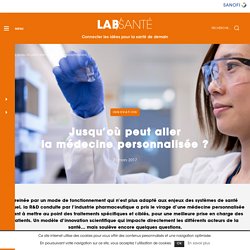
Multifactorielle et polymorphe, cette démarche novatrice vient peu à peu se substituer à la médecine traditionnelle pour garantir une meilleure prise en charge et réduire certains coûts du système de santé : diminution du nombre des bilans inadaptés et onéreux, réduction des délais d’analyse, limitation des prescriptions de médicaments inutiles, gain d’années de vie en bonne santé… Les possibilités offertes par les technologies les plus récentes, en particulier en matière de séquençage et d’analyses génétiques, font de la médecine personnalisée un complément plus qu’une alternative au modèle traditionnel. Google-plans-use-artificial-intelligence-improve-quality-life-039449. Technology giant Google is aiming to 'democratize' artificial intelligence and machine learning by making them available to everyone including users, developers, and enterprises.
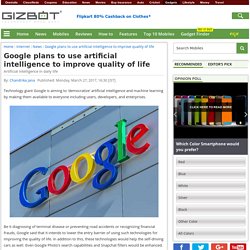
Be it diagnosing of terminal disease or preventing road accidents or recognizing financial frauds, Google said that it intends to lower the entry barrier of using such technologies for improving the quality of life. In addition to this, these technologies would help the self-driving cars as well. Even Google Photo's search capabilities and Snapchat filters would be enhanced.
Also Read: Google Talk to be replaced by Hangout from June 26th "Google's cloud platform already delivers customer applications to over a billion users every day, Now if you can only imagine, combining the massive reach of this platform with the power of AI and making it available to everyone", commented Fei-Fei Li, chief scientist of Alphabet Inc. and machine learning at Google Cloud. Google's Calico partners with new biotech firm to develop anti-aging and cancer drugs. The Google-funded startup Calico, as with many of the tech-originating firms foraying into the life sciences, has a lofty goal: to tackle the spectrum of "aging-related" diseases, which encompasses everything from Parkinson's to Alzheimer's to cancer.
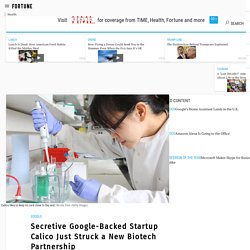
While the outfit is notoriously cagey about its work, it's certainly not shy about striking up partnerships. La reconnaissance faciale au service de la médecine. GSK and Regeneron to mine gene data from 500,000 Britons. Un hôpital adopte le superordinateur Watson pour des diagnostics rapides – Ex... L’hôpital pour enfants Alder Hey à Liverpool va devenir l’un des premiers au monde à utiliser les capacités de diagnostic de Watson, le superordinateur d’IBM. L’intelligence artificielle permettra d’analyser rapidement l’historique médical des patients tout en se référant à de vastes archives de connaissances scientifiques.
En effet, le système a déjà « lu » presque 15 millions de pages de littérature médicale et peut analyser les dossiers des patients et questionnaires médicaux pour suggérer diagnostics et traitements. La première étape sera de développer un agent conversationnel (ou « chatbot ») qui répondra aux questions des patients et de leurs parents. Ceux-ci pourront converser avec le programme et trouver réponse à toutes leurs questions, de la nourriture et jeux de l’hôpital en passant par les procédures, anesthésiants et opérations chirurgicales. Les enfants ont moins peur. On Flipboard. Medical Devices Are the Next Security Nightmare. Hacked medical devices make for scary headlines. Dick Cheney ordered changes to his pacemaker to better protect it from hackers. Johnson & Johnson warned customers about a security bug in one of its insulin pumps last fall. Who controls your medical data?
Scientists create first 3-D synchronized-beating heart tissue. 3-D fluorescent image of 3-D tissue with many cells laid down sequentially to create attached layers of alternating cell types, like membranes in the human body (credit: York University) York University scientists have created the first in vitro (lab) 3D heart tissue made from three different types of cardiac cells that beat in synchronized harmony. It may lead to better understanding of cardiac health and improved treatments.
. * Fact sheet: Who to contact with concerns about the protection of your personal health information - Office of the Privacy Commissioner of Canada. Canadians are extremely concerned about the privacy of their personal health information which can be highly sensitive. As health information falls into many categories, and may be collected, used and disclosed by a number of organizations and institutions for various purposes, it may be subject to different privacy laws across various jurisdictions. In Canada, there is, for example:
Médecine exponentielle, vie exponentielle, Séminaire le Vendredi 31 mars 2017 à l'Ecole Polytechnique à Palaiseau, Amphithéâtre Becquerel Les technologies du numérique ont envahi notre univers quotidien professionnel et personnel. Même si le numérique et la médecine se côtoient depuis un certain nombre d’années, une accélération se produit, augmentant le champ des possibles. Le premier génome humain a été décodé il y a plus de 10 ans et ce fut à l’époque un exploit qui a coûté 1 milliard de dollars. Désormais les procédés sont accessibles aux particuliers pour 140$, bientôt pour 5$, ils permettent de passer à une analyse systématique des génomes et de constituer ainsi des bases de données génomiques augmentées des données provenant des instruments (scanner, IRM …), des prélèvements en temps réel via les objets connectés, du dossier médical numérique … pour arriver au Big Data de la médecine.
Remedy - Home. Autism detectable in brain long before symptoms appear. Image copyright Thinkstock Brain scans can detect autism long before any symptoms start to emerge, say scientists. IRCAD France - Institut de Recherche contre les Cancers de l'Appareil Digestif. Robotique. Développement d'un système robotique pour la radiologie interventionnelle sous IRM. Abstract : Performing medical gestures under MRI is a promising medical approach. Todate, using MRI for interventions is still limited, despite the quality of the provided images. This limitation is mainly due to the confined physical space inside the tunnel and the complexity of the gestures. To make accessible such practices, a robotic assistance seems very relevant. 7239 Surgetique : robotique radiologique et chirurgicale - ScienceDirect. <div pearltreesdevid="PTD245" role="alert" class="alert-message-container"><div pearltreesdevid="PTD246" aria-hidden="true" class="alert-message-body"><span pearltreesdevid="PTD247" style="display: inline-block;" class="Icon IconAlert"><svg pearltreesDevId="PTD248" style="width: 100%; height: 100%;" width="24" height="24" focusable="false" tabindex="-1" fill="currentColor"><path pearltreesDevId="PTD249" fill="#f80" d="M11.84 4.63c-.77.05-1.42.6-1.74 1.27-1.95 3.38-3.9 6.75-5.85 10.13-.48.83-.24 1.99.53 2.56.7.6 1.66.36 2.5.41 3.63 0 7.27.01 10.9-.01 1.13-.07 2.04-1.28 1.76-2.39-.1-.58-.56-1.02-.81-1.55-1.85-3.21-3.69-6.43-5.55-9.64-.42-.52-1.06-.83-1.74-.79z"></path><path pearltreesDevId="PTD250" d="M11 8h2v5h-2zM11 14h2v2h-2z"></path></svg></span><!
-- react-text: 61 -->JavaScript is disabled on your browser. Please enable JavaScript to use all the features on this page. <! -- /react-text --></div></div> Towards an ethical Artificial Intelligence – Julie Desk. With the increasing presence of autonomous agents in our daily lives, Artificial Intelligence specialists propose to implement a set of ethical rules to allow them to realize the extent of their actions. Others seek the establishment of a right for robots as a way to resolve the emerging legal issues Among the numerous articles dedicated to autonomous cars today, one particular thought experiment resurfaces often: the trolley problem.
Adapted to self-driving cars, it is usually presented as follows: an autonomous car, with a person onboard, sees five pedestrians suddenly appear in its path. First FDA Approval For Clinical Cloud-Based Deep Learning In Healthcare. Une intelligence artificielle identifie des cancers de la peau mieux que des ... Une équipe d'ingénieurs et de dermatologues a créé une IA capable d'identifier différents types de cancers de la peau. Lancement d'un projet d'intelligence artificielle contre le cancer - Sciencesetavenir.fr.
La société française Oncodesign, sous-traitant de l'industrie biopharmaceutique pour la partie recherche, va bénéficier d'une aide de 7,7 millions d'euros du Programme d'investissements d'avenir (PIA) pour développer des solutions d'intelligence artificielle contre le cancer, selon un communiqué publié mardi. Le projet OncoSNIPE, doté d'un budget total de 12 millions d'euros, va faire appel à des solutions "bio-informatiques" comme l'intelligence artificielle pour identifier et caractériser des patients résistants aux traitements anti-cancéreux, selon le communiqué commun d'Oncodesign et de Bpifrance.
Le but sera d'"orienter la recherche et le développement de solutions thérapeutiques spécifiques" pour ces patients, en ciblant les cancers du sein, du pancréas et du poumon, où les résistances aux traitements actuels peuvent être particulièrement élevées.